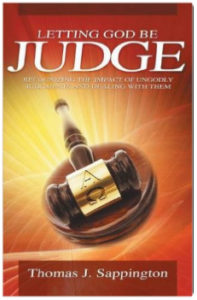Dear friends,
I’ve recently finished reading a stimulating book required for a course I’m taking in the fall on Spiritual Warfare. The book is by the professor of the course, Thomas Sappington, and it is entitled, “Letting God Be Judge.” It focuses on the dangers of making or receiving ungodly judgments, and how to overcome the spiritual impact of these judgments.

From his many years in stateside and international ministry, Dr. Sappington has learned that there is tremendous negative power when ungodly judgments are made against God, ourselves or others. Freedom in Christ happens when we break the stronghold of these judgments, repenting of times we have judged others in inappropriate ways. He emphasizes that there are absolutely times, according to many passages in the Bible, when “godly judgment” or discernment is required. In contrast to this, he says, “an ungodly judgment is a negative attitude, mindset, and set of expectations toward another, which can be directed toward God, ourselves or others.” (p.19) We set our emotions, thoughts and expectations against someone and we judge them, even though we may be unaware we are doing it at the time. The Bible is replete with instructions not to judge others (Matt. 7:1-5; Romans 14:9-13; James 2:1-4; James 4:11-12; etc.)
Why is judging others in ungodly manners inappropriate? Sappington shares that it is incompatible with the gracious way God treats us in Christ, it is incompatible with a life of humility, and it is incompatible with the fact that only God has the right to judge. So how do you know if you are engaging in godly discernment or ungodly judgment? Sappington gives eight questions to ask yourself, which I found extremely helpful in probing my own soul:
- Would we feel comfortable if they viewed and evaluated us in the same way we are evaluating them?
- Are we giving proper attention to their strengths as well as their weaknesses?
- Are we developing “spiritual far-sightedness,” blind to our own shortcomings?
- Are we hoping, believing and praying that they can change for the better?
- Are we evaluating their behavior rather than speculating about their hidden motives and intentions?
- Do we regard them as brothers and sisters in Christ rather than looking down on them because of their sins and their shortcomings?
- Are we discriminating against certain groups of people?
- Are we consciously choosing to leave judgment in God’s hands?
For each of these question, he shares biblical passages which address the heart issues.
While much more could be shared, I found this small book one of the most penetrating, challenging and inspiring books I’ve read in a while, for it is all too common, especially in the church, for believers to be quick to judge others, finding fault with their actions or intentions, thinking we know better and others should be more like us. Isn’t that the height of pride and arrogance? Sappington focuses in repeatedly on ungodly judgments made in the home, and I have to ask the question, “In what ways have I judged my wife and children inappropriately?” The impact of parents judging kids AND kids judging parents is enormous, and can last for years and spread to entire groups of people. As we head down the path of judging, soon everything the other person says and does is interpreted in the light of that judgment. As we judge others instead of leaving judgment to God, Sappington says our relationship with God is negatively impacted, we limit ourselves and God’s work in our lives, and we give the devil an opportunity to work in our and other people’s lives (Eph.4:26-27).
So how do we break the power of ungodly judgments? Sappington shares that first we must confess the sin of judging the other person and receive God’s forgiveness as we ask God to reveal underlying areas of deception behind the judgment. We choose to forgive the wrongs the other person has committed against us, “letting God be judge.” Sappington also says we must use our spiritual authority to break the power of ungodly judgments in our lives and the lives of others, for there are evil spirits who work through these judgments to harm us, others and the cause of Christ. Finally, we commit to correct the harm we have caused due to our judgments, and commit by God’s grace not to engage in ungodly judgments in the future. Nipping the seeds of judgment in the bud of our hearts when we first detect a negative attitude, emotion or disposition toward another will be a vital skill and habit to develop.
In summary, I found this subject and Sappington’s treatment of it highly applicable and relevant in my own life, and would wholeheartedly encourage you to consider these issues and how God’s Spirit might be challenging you to move away from making ungodly judgements and instead let God be judge!
Pressing on by His grace, Eric
